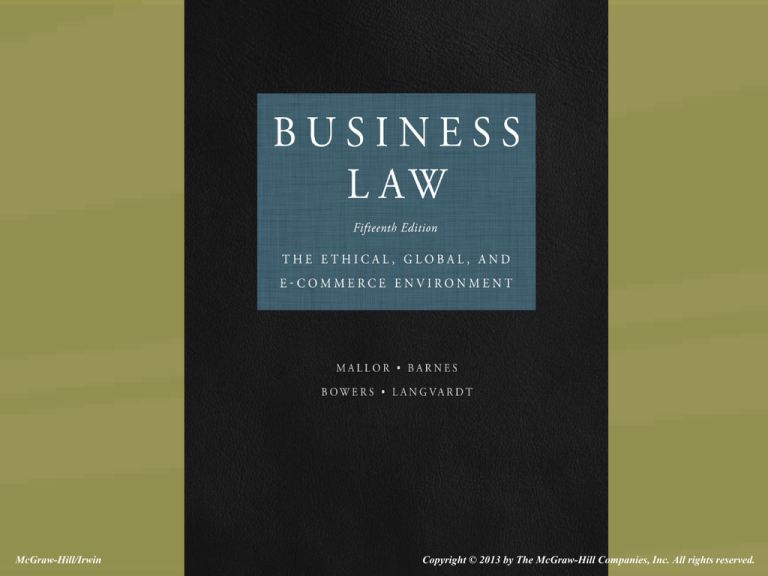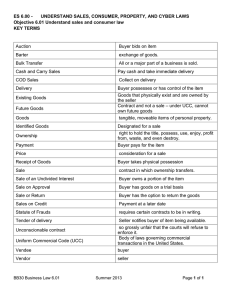
McGraw-Hill/Irwin
21-1
Copyright © 2013 by The McGraw-Hill Companies, Inc. All rights reserved.
P
A
R
T
Sales
4
• Formation and Terms of Sales Contracts
• Product Liability
• Performance of Sales Contracts
• Remedies for Breach of Sales Contracts
21-2
C H A P
T
E R
21
Performance of
Sales Contracts
Business neglected is
business lost.
Daniel Defoe, novelist,
The Complete English
Tradesman (1726)
21-3
Learning Objectives
• Explain meaning of good faith,
course of dealing, and trade usage
• List basic obligations and rights of
buyer and seller for delivery of and
payment for goods
• Explain when acceptance of goods
occurs, the effect of acceptance,
and right of revocation
21-4
General Rules of The UCC
• UCC is flexible, but general rules apply:
– Parties must act in good faith in the
performance of a sales contract [1–203]
– If express terms of contract conflict with past
course of dealing between parties, express terms
prevail [1–205(4)]
– If express terms of contract conflict with trade
usage, express terms prevail [1–205(4)]
– Consideration not required to support
modification of contract, but parties may specify
that writing required [2–209]
21-5
More General Rules
• If first party repeatedly fails to
perform as agreed and second
party fails to object, second
party may have waived rights to
cancel contract based on
inadequate performance [2–
208(3), 2–209(4)]
– Second party may retract waiver
by reasonable notice to first party
requiring strict performance [2–
209(5)]
21-6
Delivery Under The UCC
• Basic duty of seller is to deliver goods that
conform to contract with the buyer and
basic duty of buyer is to accept and pay for
goods if they conform to contract [2–301]
• Goods are to be delivered at seller’s place
of business unless otherwise specified by
contract
– Within reasonable hours and for a
reasonable period of time, so buyer can
take possession of goods [2–503]
21-7
Inspection Under The UCC
• Generally, buyer has right to inspect goods
before he accepts or pays for them
• If goods conform to contract, buyer must pay
expenses of inspection, but if goods do not
conform to contract, buyer may recover
inspection expenses from seller [2–513(2); 2–
715(1)]
21-8
Payment Under The UCC
• Buyer and seller may agree that price of goods is
to be paid in money or other goods, services, or
real property
• Payment may be more difficult in international
sales, thus seller often insists on receiving an
irrevocable letter of credit (diagram, page 578)
– Resolves currency issues and payment assurance
21-9
Acceptance & Revocation
• Buyer may revoke acceptance of nonconforming
goods where:
– Nonconformity substantially impairs value
– Buyer accepted goods without knowledge of nonconformity (discovering nonconformity difficult)
– Buyer accepted goods because seller assured
buyer it would cure defect [2–608(1)]
– See Waddell v. L.V.R.V. Inc.: repeated attempts to
cure defects failed and buyers revoked
acceptance
• Once goods accepted, buyer obligated to pay
– Example: Weil v. Murray
21-10
Rejection Under The UCC
• If a buyer rejects a delivery of goods,
buyer must act within reasonable time
after delivery and give seller notice of
rejection, preferably in writing [2–602]
– Buyer should state all defects on which
rejection is based
– Seller may be able to cure nonconformity
– See Fitl v. Strek
21-11
Assurance Under The UCC
• If one party has reasonable basis for concern
that other party may not perform, concerned
party may demand assurance from the other
party that the contract will be performed
– Koch Materials Co. v. Shore Slurry Seal, Inc.
• If assurances not given within reasonable
time (< 30 days), contract repudiated [2–609]
– Repudiation may be withdrawn by clear
indication of intention to perform
• Must be before other party cancels
21-12
Assurances &
International Contracts
• Convention on Contracts for the International
Sale of Goods Art. 71: party may suspend
performance if it becomes apparent that other
party will not perform substantial part of
obligations due to: (a) a serious deficiency in
ability to perform or credit-worthiness; or (b) his
conduct in preparing to perform or in
performing the contact
– Suspending performance requires immediate
notice to other party and must continue with
performance if other party provides assurances
21-13
Excuse for Non-Performance
• Code rules for determining when a
party is excused from performing similar
to general contract rules
– Test of impossibility
• In most situations, however, Code uses
the test of commercial impracticability
– Performance highly impracticable,
unreasonably expensive, or little value to
promisee [UCC 2–615]
21-14
Thought Question
• If you contracted with another party for a
long-term sale of goods contract, such as
cement for a construction project, what
kind of activities would prompt you to
demand assurances of performance?
21-15








